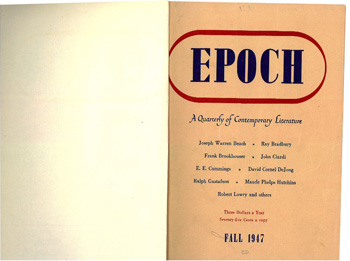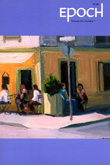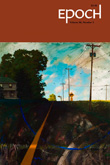COVER STORY SIDEBAR
Epoch: A decades-long history of publishing authors' earliest works
Epoch, Cornell's literary magazine, has a national reputation for publishing traditional and experimental work by exemplary authors. Each year's three issues feature fiction and poetry, and sometimes essays, graphic art, screenplays or cartoons. "We've been a pretty formidable magazine for 62 years," says editor and lecturer Michael Koch, "helping to shape and sustain American writing."
A literary magazine at Cornell was first proposed by Goldwin Smith Professor of English Baxter Hathaway when he came to Cornell in 1946 to work on the creative writing program, but C.B. deKiewiet, dean of the College of Arts and Sciences at the time, refused to spend Cornell funds on a magazine that published non-Cornell writers. So Hathaway gathered a group of writers, and in 1947 they launched Epoch with their own money. They continued to support the magazine for the next decade with white elephant sales and monthly fees the editors themselves paid for the privilege of reading the submissions.
Today's editors no longer have to pay to read submitted manuscripts; over the years, Epoch has become integrated into the graduate creative writing program at Cornell. MFA students now spend the first year of their program working as associate editors on the magazine, in addition to their class work.
Koch gestures toward a tall wooden bookshelf against the wall of the Epoch office. Empty on this summer day, he says that by fall it will be filled "top to bottom" with manuscripts, and won't empty again until three weeks after the magazine stops accepting submissions for the following summer. MFA students assess each of these manuscripts as first readers, and then discuss their choices with Koch. Out of the thousands of submissions, only 20 to 30 stories and fewer than 30 poems will be accepted for publication each year.
Many now-famous authors found early acceptance in Epoch -- including Thomas Pynchon, Philip Roth and Joyce Carol Oates. Epoch's 1947 debut issue included work by Ray Bradbury and e.e. cummings. Don DeLillo published his very first story in Epoch in 1960; during Epoch's 50th anniversary celebration in 1997, DeLillo spoke of how important being accepted into the magazine had been for him. More recently, Jhumpa Lahiri's Pulitzer Prize-winning collection, "The Interpreter of Maladies," included a story that first appeared in Epoch, and poems by Yusef Komunyakaa, the 1994 Pulitzer winner, have appeared in the magazine's pages.
Many graduate students who have worked on Epoch have become literary stars. On the long table in Epoch's office sits a stack of books published by former staffers, including Susan Choi, a 2003 Pulitzer Prize finalist who now teaches at Princeton, and Junot Díaz, the 2008 Pulitzer Prize winner, who is a professor at the Massachusetts Institute of Technology.
Despite its small circulation, Koch says Epoch is recognized nationally as a significant place to publish. Works from Epoch are regularly reprinted in such major anthologies as Best American Short Stories, Best American Poetry, The Pushcart Prize: Best of the Small Presses and Prize Stories: The O. Henry Awards.
Linda Glaser is a freelance writer.


